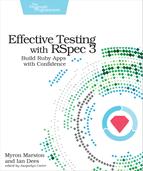Your Turn
In this chapter, you’ve learned the major parts of an expectation: the expect method, the subject, to/not_to, and the matcher. You wrote some simple expectations using expect and a few of RSpec’s built-in matchers. You saw how to combine matchers by passing them into one another, and by combining them with and/or.
In the next chapter, we’ll take you on a tour of the matchers that RSpec ships with. But first, test your newfound knowledge of expectations with a quick exercise.
Exercise
We’ve prepared an unfinished spec file that will give you the chance to try out the concepts explained in this chapter. We encourage you to download it, run it, and edit it until you’ve gotten all the specs to pass consistently:
| | require 'date' |
| | |
| | class DataGenerator |
| | def boolean_value |
| | [true, false].sample |
| | end |
| | |
| | def email_address_value |
| | domain = %w[ gmail.com yahoo.com aol.com hotmail.com ].sample |
| | username_characters = (0..9).to_a + ('a'..'z').to_a + ('A'..'Z').to_a |
| | username_length = rand(5) + 3 |
| | username = Array.new(username_length) { username_characters.sample }.join |
| | |
| | "#{username}@#{domain}" |
| | end |
| | |
| | def date_value |
| | Date.new( |
| | (1950..1999).to_a.sample, |
| | (1..12).to_a.sample, |
| | (1..28).to_a.sample, |
| | ) |
| | end |
| | |
| | def user_record |
| | { |
| | email_address: email_address_value, |
| | date_of_birth: date_value, |
| | active: boolean_value |
| | } |
| | end |
| | |
| | def users(count) |
| | Array.new(count) { user_record } |
| | end |
| | end |
| | |
| | RSpec.configure do |c| |
| | c.fail_fast = true |
| | c.formatter = 'documentation' |
| | c.color = true |
| | c.order = :defined |
| | end |
| | |
| | RSpec.describe DataGenerator do |
| | def be_a_boolean |
| | # Ruby has no Boolean class so this doesn't work. |
| | # Is there a way we can use `or` to combine two matchers instead? |
| | be_a(Boolean) |
| | end |
| | |
| | it "generates boolean values" do |
| | value = DataGenerator.new.boolean_value |
| | expect(value).to be_a_boolean |
| | end |
| | |
| | def be_a_date_before_2000 |
| | # Combine the `be_a(klass)` matcher with the `be < value` matcher |
| | # to create a matcher that matches dates before January 1st, 2000. |
| | fill_me_in |
| | end |
| | |
| | it "generates dates before January 1st, 2000" do |
| | value = DataGenerator.new.date_value |
| | expect(value).to be_a_date_before_2000 |
| | end |
| | def be_an_email_address |
| | # Pass a simple regex to `match` to define a matcher for email addresses. |
| | # Don't worry about complete email validation; something very simple is fine. |
| | match(/some regex/) |
| | end |
| | |
| | it "generates email addresses" do |
| | value = DataGenerator.new.email_address_value |
| | expect(value).to be_an_email_address |
| | end |
| | |
| | def match_the_shape_of_a_user_record |
| | # Use `be_a_boolean`, `be_a_date_before_2000` and `be_an_email_address` |
| | # in the hash passed to `match` below to define this matcher. |
| | match(fill_this_in: "with a hash describing the shape of the data") |
| | end |
| | |
| | it "generates user records" do |
| | user = DataGenerator.new.user_record |
| | expect(user).to match_the_shape_of_a_user_record |
| | end |
| | |
| | def all_match_the_shape_of_a_user_record |
| | # Combine the `all` matcher and `match_the_shape_of_a_user_record` here. |
| | fill_me_in |
| | end |
| | |
| | it "generates a list of user records" do |
| | users = DataGenerator.new.users(4) |
| | expect(users).to all_match_the_shape_of_a_user_record |
| | end |
| | end |
Footnotes
Copyright © 2017, The Pragmatic Bookshelf.
..................Content has been hidden....................
You can't read the all page of ebook, please click here login for view all page.
